Coconut is considered as the Philippines’ top agricultural export, with US$1.49 billion revenues generated in 2011. It is planted in 68 provinces in the country, covering 3.56 million hectares. The coconut industry is the source of income of 3.5 million farmers, providing important economic support to the rural communities. However, low productivity (46 nuts/palm/year) from old and senile palms is one of the challenges facing the industry. Currently, the country has more than 75 million old and unproductive palms in 1.03 million hectares, which represent one-third of the total bearing trees that need to be replaced. Due to the devastation of recent strong typhoons in Visayas and Mindanao and coconut scale insect infestation in CALABARZON Region, a significant number of damaged palms require immediate replanting.
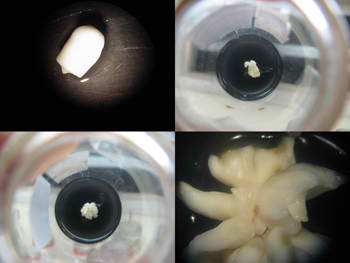
The first four stages of coconut tissue culture using CSet are (from top left) plumule excision, calloid initiation, calloid multiplication, and somatic embryo in its immature stage. (Photo from Dr. Cristeta A. Cueto, PCA – Albay Research Center)
To address these industry challenges in the industry, the Philippine Council for Agriculture, Aquatic and Natural Resources Research and Development of the Department of Science and Technology (DOST-PCAARRD) developed and implemented the Coconut Industry S&T Program (ISP). The Coconut ISP focuses on the rapid production of quality planting materials of high yielding coconut varieties, management control strategies against insect pests and diseases, genomic-assisted breeding, and improvement of production of coconut high value products to increase productivity and sustain the viability of the industry.
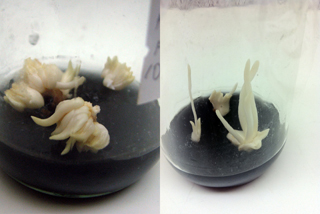
Mature somatic embryos (left) and the formation of shootlets (right) (Photo from Dr. Cristeta A. Cueto, PCA – Albay Research Center)
The Coconut ISP addresses the need for quality planting materials through the somatic embryogenesis technology (CSet), a tool for rapid mass propagation of superior genetic stocks using immature flowers, immature embryos, and plumule or the meristematic part of the embryo.
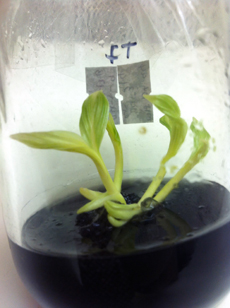
The stage of plantlet regeneration in the PCA laboratory (Photo from Dr. Cristeta A. Cueto, PCA – Albay Research Center)
The CSet project is funded by DOST-PCAARRD and tested and evaluated by researchers from the Philippine Coconut Authority (PCA), University of the Philippines (UP), Bicol University (BU), and Visayas State University (VSU). To date, more than 12,000 plumules were excised and initiated for callus formation with 56% efficiency adopting the enhanced PCA-CSet protocol in seven upgraded/equipped laboratories in PCA-Albay Research Center, PCA-Zamboanga Research Center, UP Los Baños (UPLB), UP Mindanao, Bicol University College of Agriculture and Forestry (BUCAF), and VSU.
The protocol is currently being enhanced to attain as much as 1,000 seedlings per plumule using explants from high yielding tall and dwarf coconut varieties.
Use of CSet-derived planting materials will help the country replace the existing old and senile coconut trees, typhoon-damaged, and insect-infested palms. The technology is expected to benefit the farmers in coconut growing areas and suitable coastal areas in Regions: 4A, 5, 6, 7, 8, 9, 11, 12, and ARMM.
To date, the project is now able to produce 80-120 seedlings per plumule.
DOST-PCAARRD will showcase coconut somatic embryogenesis, together with other agri-aqua S&T research and development (R&D) outputs on March 2-4, 2016 during the SIPAG FIESTA at its headquarters in Los Baños, Laguna.
SIPAG, a technology transfer strategy, embodies the Council’s commitment to DOST’s Outcome One in a bid to ensure that the fruits of R&D activities for the agri-aqua sectors will be a blessing for every Juan.
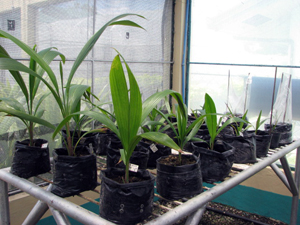
Plantlets in the screenhouse of PCA, Albay Research Center (Photo from Dr. Cristeta A. Cueto, PCA – Albay Research Center)
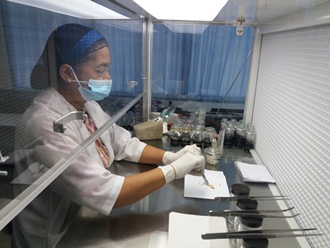
A laboratory technician shows the excision of coconut plumules (Photo by Dr. Maria Lourdes Cedo, University of the Philippines Los Baños)
by Sharie Al-Faiha A. Abustan, Edna A. Anit, DOST-PCAARRD S&T Media Service
